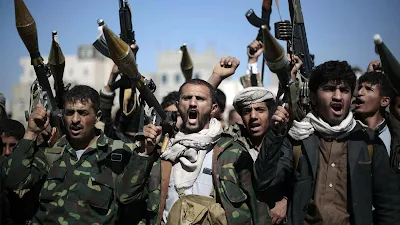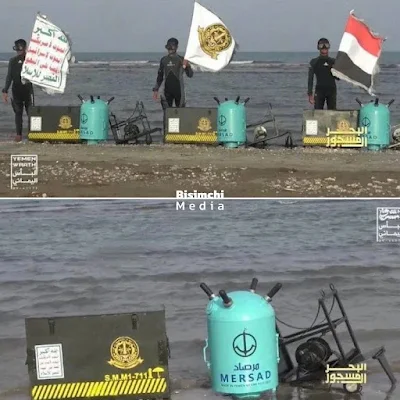Who are the Houthis, their history and their objectives
The Houthis are a rebel group that controls much of Yemen, a Middle Eastern country suffering from one of the world's worst humanitarian crises.
In this article, we are going to explain who the Houthis are, their history and their objectives.
 |
| Who are the Houthis, their history and their objectives |
History
The Houthis emerged as a political and religious movement in the 1990s, led by Hussein Badreddin al-Houthi, a Zaidi cleric who opposed Saudi Arabia and the United States' influence in Yemen. Al-Houthi accused the Yemeni government of corruption, marginalization and oppression of the Zaydis.
In 2004, the government launched a military campaign against al-Houthi followers, who had taken up arms in the northern province of Saada. The conflict intensified after al-Houthi's death in that same year, and his brothers assumed leadership of the movement.
The Houthis took advantage of the power vacuum created after the 2011 Arab Spring, which led to the resignation of President Ali Abdullah Saleh after 33 years in power. The Houthis allied themselves with Saleh, their former enemy, and took control of the capital, Sanaa, in 2014, forcing President Abd Rabbu Mansour Hadi to flee south.
In 2015, a Saudi-led coalition intervened militarily in Yemen to restore Hadi's government and stop the advance of the Houthis, who are supported by Iran. Since then, the country has been mired in a civil war that has left more than 230,000 dead, 4 million displaced and 24 million people in need of humanitarian aid.
Goals
The Houthis' objectives are to defend their territory, their identity and their autonomy against what they consider external and internal aggression. The Houthis demand greater political and economic participation in the country, as well as respect for their cultural and religious rights. The Houthis also aspire to have a balanced relationship with their regional neighbors, especially Saudi Arabia and Iran.
The Houthis define themselves as a nationalist and revolutionary movement that fights for liberation and social justice. However, their detractors accuse them of being a sectarian and violent militia that seeks to impose their ideology and expand their influence in the region.
The Houthis and maritime trade
One of the most serious consequences of the war is the impact it has on maritime trade, especially in the strategic Bab al-Mandeb Strait, which connects the Red Sea with the Indian Ocean. Thousands of merchant ships transporting oil, gas and other products essential to the global economy sail through this passage every year. The Houthis have threatened to blockade the strait and have launched several attacks against civilian and military ships, using missiles, drones and sea mines.
These attacks put the security and stability of the region and the world at risk, and constitute a violation of international humanitarian law and United Nations Security Council resolutions. In addition, they aggravate the humanitarian situation in Yemen, by making it difficult for aid and supplies to reach the population suffering from the coalition's siege and bombing. The Houthis have also been accused of diverting and stealing some of that aid to finance their war.
Causes of Houthi attacks on merchant ships
The Houthis have resorted to attacks on merchant ships as a way to pressure the Saudi coalition and the international community to end the naval blockade that is preventing humanitarian aid and fuel from entering the country, which is suffering the worst humanitarian crisis in the world. world according to the UN. The Houthis also seek to demonstrate their military capacity and their resistance against the air and ground superiority of the Saudi coalition, which has bombed their positions and infrastructure for more than six years. In addition, the Houthis aim to alter the balance of power in the region and challenge the influence of Saudi Arabia and Iran, which are vying for control of the Bab el-Mandeb Strait, a strategic route for the transport of oil and other goods.
The Houthis have used different means to attack merchant ships, including sea mines, explosive-laden speedboats, anti-ship missiles and drones. These attacks have caused material and human damage, as well as the temporary closure of some ports and increased insurance and transportation costs. Some examples of these attacks are:
- In April 2018, the Houthis attacked a Saudi oil tanker in the Red Sea, causing a fire on the ship.
- In July 2018, the Houthis attacked two oil tankers in the Bab el-Mandeb Strait, prompting Saudi Arabia to temporarily suspend its crude oil exports through that route.
- In October 2019, the Houthis attacked an Iranian ship in the Red Sea, causing damage to its hull.
- In November 2020, the Houthis attacked a commercial ship in the Gulf of Aden with a drone loaded with explosives.
- In March 2021, the Houthis attacked an oil tanker in the Red Sea with an anti-ship missile.
- In June 2021, the Houthis attacked a container ship in the Red Sea with a suicide speedboat.
 |
| Houthis and anti-ship mines |
Consequences of Houthi attacks on merchant ships
Houthi attacks on merchant ships have serious consequences for maritime security and international trade, as well as the humanitarian and political situation in Yemen and the region.
- The attacks put the lives of crews and the marine environment at risk by causing fires, explosions and oil spills.
- The attacks affect the flow of trade between Europe, Asia and Africa, by hindering transit through the Bab el-Mandeb Strait, through which nearly 10% of world trade and 4% of global oil supply pass.
- The attacks increase tension between Saudi Arabia and Iran, which accuse each other of being behind these acts. This can escalate to a direct armed conflict between both countries or their regional allies.
- The attacks make it difficult to find a political solution to the conflict in Yemen, by distancing the parties from the negotiating table and increasing mistrust and hostility. This prolongs the suffering of the Yemeni population, who suffer from famine, disease, displacement and violence.
Possible solutions to prevent Houthi attacks on merchant ships
To prevent a repeat of Houthi attacks on merchant ships, both short- and long-term measures are required, involving all relevant actors.
- In the short term, maritime security and international cooperation need to be strengthened to prevent, detect and respond to attacks. This involves increasing naval and air presence, sharing information and intelligence, deploying defense and warning systems, and coordinating joint actions. Merchant ships also need to be protected with escorts, radars, electronic countermeasures and defensive weapons. Additionally, facilitating humanitarian access and fuel supplies to Yemen is needed to ease the crisis and reduce the Houthis' incentive to attack.
- In the long term, an inclusive and sustainable peace process needs to be promoted to end the conflict in Yemen, which addresses the structural causes and legitimate demands of the parties. This involves ceasing hostilities, resuming political dialogue, respecting international humanitarian law and human rights, ensuring the participation of civil society and women, and supporting the reconstruction and development of the country. Likewise, regional stability and cooperation need to be promoted through dialogue and diplomacy between Saudi Arabia and Iran, as well as between their allies. This involves reducing external interference, respecting Yemen's sovereignty and territorial integrity, and promoting collective security and shared development.
Attacks on Israel
Since the start of the war with Hamas, the Houthis have launched a series of attacks against Israeli territory. According to Saudi Arabia, the Houthis have the military, financial and political backing of Iran, and that it would be this regime that would be behind the Houthis' decision to attack Israel. The Houthis assure that Israel is committing a “genocide” in Gaza against which they will not sit idly by.





Comments
Post a Comment